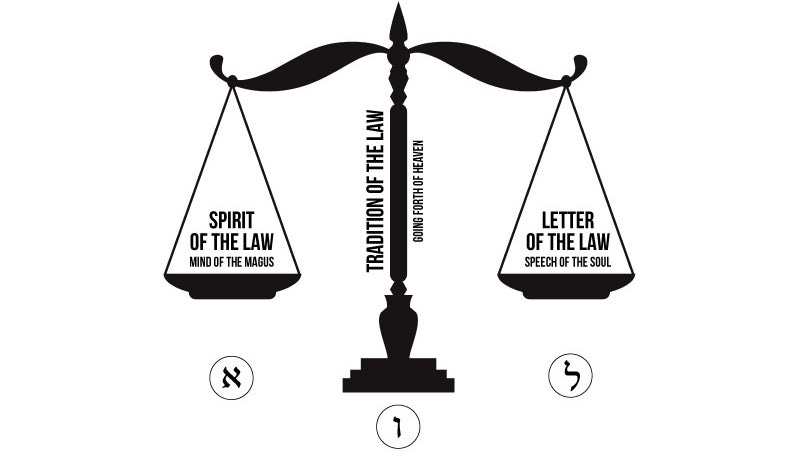Do what thou wilt shall be the whole of the Law.
Let’s talk about a-a-a-authority.
I know. I know. It’s a dirty word in Thelemaville.
The moment you drag out the word authority people start to think you’re about to slap on the chains and drag them off to the salt mines or something. Or you’re going to put on a funny hat and tell them they have to think or believe a specific sorta way.
Ridiculous, right?
Authority is a funny thing, though.
We bend to it. We rebel against it. We utilize it. We share it. We gravitate toward it. We use it. We abuse it. We try to balance it.
We can never avoid it.
Yet in Thelema, we never properly address it. So many try to pretend that authority and authoritarianism are the only equivalence1>I mean, in one sense, they are. In psychology, we separate parenting styles into authoritative, authoritarian, permissive, and uninvolved. So, in that sense, authoritarianism and authority do go together, but not in a positive way. The same would apply to governing, in my opinion. But there are other modes that are overlooked if one only sees authoritarianism as the only expression of authority. and then denigrate authority as the “bad thing” we don’t really talk about. Others claim to adhere to no authority but follow one organization or another for their framework, implicitly adhering to a body of authority nonetheless through that avenue.
However, considering the larger Body of Nuit, I wondered if there was an effective perspective on greater Authority that moderated the authoritarian, institutional sense of fossilized dogma while wrangling the liberal impulse toward doctrinal ambiguity. It needed to offer a bulwark against imposed magisterial canons like the Catholic Church and a more grounded approach than feel-good speeches like the Unitarian Universalists.
I endeavored to identify a method that harmoniously integrated the foundation of hierological stability with the innovation of personal creativity while simultaneously discovering a tertiary element to achieve equilibrium between the two.
It was my work with The Three Rivers that snapped it all into place for me.
Exploring Authority
A tripartite approach to authority examines three different elements of the Law—the spirit of the law, the letter of the law, and the tradition of the law—and forms a whole out of all the parts, each equally necessary for both the anchoring of and for the innovation within the Law of Thelema.

This outline follows precisely the same formula as the refuge of The Three Rivers: the Mind of the Magus (the Spirit of the Law), the Speech of the Soul (the Letter of the Law), and the Going Forth of Heaven, (the Tradition of the Law).2For those entangled with the English Qaballa, I have left you some additional clues.
Letter of the Law: The Binding Word
Religious teaching, regardless of the culture or era from which it emerges, often presents itself first and foremost as written or spoken law. It is the codified rule—the precise utterances, verses, maxims, and injunctions that delineate acceptable conduct, prescribe ritual, and distinguish sacred from profane. The Letter of the Law offers clarity. It demarcates boundaries. It is the vessel that ensures continuity across generations by providing a fixed point of reference.
When we speak of the Letter of the Law, we’re describing the tangible aspect of religious teachings—specifically, the Book of the Law. Think of it as the visible face of Thelemic spirituality and religiosity: it offers a sense of personal and communal mystery, a worship expression centered around the Law of Thelema, a sacramental reality, a historical identity, a feeling of being part of the entire Body of Nuit, and a holistic spirituality.
These words and actions give practitioners a sense of belonging. They connect individuals to something larger—a shared language of faith that unites diverse voices. Without this clear, communal expression, spiritual understanding might remain vague or disconnected. And yet the paradoxical aspect of the Speech of the Soul, especially as found through the Book of the Law, is that while it offers a historical anchor, it is still a living document that speaks individually to each of us differently. We are bound together by our connection to the Book of the Law generally while recognizing our individuality through our unique and specific perspectives of the Book of the Law.
The Letter of the Law could be likened to the Khabs of the individual, the inner motivating aspect that is immutable and directed, that which is uniquely ours and yet finds its expression and expansion in every other Khu around us.
However, the Speech of the Soul also has its challenges. Rote memorization, mindless repetition, and soulless adherence to dogma can reduce Thelema to just another practice on the world’s buffet of belief systems. Therefore, the letter of the Law, the symbols by which we illustrate our individual and collective meaning, must always point toward something beyond itself, always reflecting outward through action, guiding us all toward a living relationship with the dynamic world in which we live.
Spirit of the Law: The Living Breath
The spirit of the Law is that element that moves in mysterious ways. It’s the trickster element. For Thelemites, it’s the Mind of the Magus, the messenger, the psychopomp if you will—that guide of the soul—that reveals the Law to the world generally, but also to each of us specifically.
But he doesn’t stop there.
If the letter of the Law is the sinews and muscle of our spiritual life and the tradition of the Law is the mind and heart of our spiritual life, then the spirit of the Law is the elusive, restless pulse coursing through both—personified best, perhaps, by the figure of the Magus, the messenger. In countless pagan and indigenous traditions, the spirit of belief is not delivered by an austere prophet or dogmatic authority—and let’s face it: is there anyone less austere or dogmatic than Crowley when it comes to Thelema?—but by a playful, paradoxical intermediary: the cunning fox, the sly raven, the shapeshifter, the fool. This messenger does not merely communicate the tenets of the doctrine; they test it, invert it, and ensure it does not calcify into empty habit.
Crowley, via the Mind of the Magus, reminds us that we each, individually, animate the Law. This is the rebellious, mutable spirit of Thelema. It represents something outside the letter of the Law and yet still shaped by it. It is not feral, yet it is still wild.
Crowley represents the living breath of the Law precisely because he refuses to allow it to be embodied as static. He compels us to question, explore, and ultimately internalize our engagement with the Law. He refuses to let the doctrine harden into dogma, urging us to continuously renew the depth of our understanding. We are constantly reminded that no doctrine is complete, that interpretation is fluid, and that Thelemic fidēs, like life itself, is active and dynamic.
To engage with the Spirit of the Law, then, is to engage in an ongoing dialogue—internally and externally—one in which conviction is always destabilized, but knowledge and wisdom are deepened through adaptability and wit. Crowley, as the Magus, teaches that no law, however venerable, is beyond question and no tradition is too sacred to be reimagined. The true spirit of doctrine is not locked in permanence but found in the liminal, the unexpected, the playful tension between order and chaos.
Tradition of the Law: The Weaving of Time
Finally, there’s the Going Forth of Heaven—Tradition itself as an enduring path.
Tradition is the loom upon which the letter and the spirit are woven together. It is the continuity of Thelema across time—not merely the preservation of past practices but the dynamic, generational transmission of wisdom. Tradition carries the accumulated experiences, interpretations, and adaptations of theologians and lay practitioners alike. It evolves like a forest: growing, decaying, regenerating, yet maintaining an identifiable ecosystem.
Despite the Western Protestant myths otherwise, the Roman Catholic Church never fails to surprise me with its doctrines: “Tradition is therefore something living and vital, an ongoing process in which the unity of faith finds expression in the variety of languages and the diversity of cultures. It ceases to be Tradition if it fossilises.”3International Theological Commission. 2011. “Theology Today: Perspectives, Principles and Criteria.” 2011.
It ceases to be Tradition if it fossilises.
That’s a powerful sentence.
Tradition is communal. It requires participation and the willingness to carry forward what is valuable while allowing what is outdated to compost. Doctrine, thus, becomes less about the immutable foundation or the mutable spirit and more about a community of lived experience—a dialogue between past and present, individual and collective, always pushing forward into the future.
Tradition is also like a flowing river, continually nourished by countless tributaries. It carries the essence of past insight, yet it naturally evolves to meet new contexts and new generations of seekers and participants. Each generation contributes to this flowing stream, adding new understandings while preserving core truths.
Yet the Tradition of the Law also requires careful stewardship. Tradition risks stagnation if practitioners refuse change, or risks dilution if wisdom is abandoned too lightly. Balance is key—tradition must be honored yet also remain adaptable, ensuring the teachings remain meaningful, practical, and relevant.
Authority of the Law
When considered together, the letter, spirit, and tradition of Thelemic authority form a holistic triad. The letter provides structure and identity, the spirit animates and deepens understanding, and the tradition both preserves and evolves doctrine and stabilizes community.
Understanding authority through this lens reveals it not as a chain that binds but as a living tapestry, ever in the process of being woven. For another metaphor, the letter of the Law is much like the warp threads that provide the structure on which everything else relies. It is stable, strong, clearly defined, and consistent. The spirit of the Law is the weft threads that embody the dynamic spirit—flexible, adaptable, creative, responsive, and provide the color to turn the straight warp into a vibrant work of art. And, finally, the tradition of the Law is much like the design of the tapestry itself, a recognizable continuity emerging from the accumulated wisdom and collective storytelling passed down over generations.
Authority is a complex issue. I don’t think it’s safe in the sole hands of an institutional power. Nor do I think doctrinal ambiguity is healthy for the future of Thelema. While I don’t have all the answers nor any thought for how this could play out, Thelema needs the stability of its past to ground solid wisdom in the present while it continues to evolve into the future.
Love is the law, love under will.
Footnotes
- 1>I mean, in one sense, they are. In psychology, we separate parenting styles into authoritative, authoritarian, permissive, and uninvolved. So, in that sense, authoritarianism and authority do go together, but not in a positive way. The same would apply to governing, in my opinion. But there are other modes that are overlooked if one only sees authoritarianism as the only expression of authority.
- 2For those entangled with the English Qaballa, I have left you some additional clues.
- 3International Theological Commission. 2011. “Theology Today: Perspectives, Principles and Criteria.” 2011.

